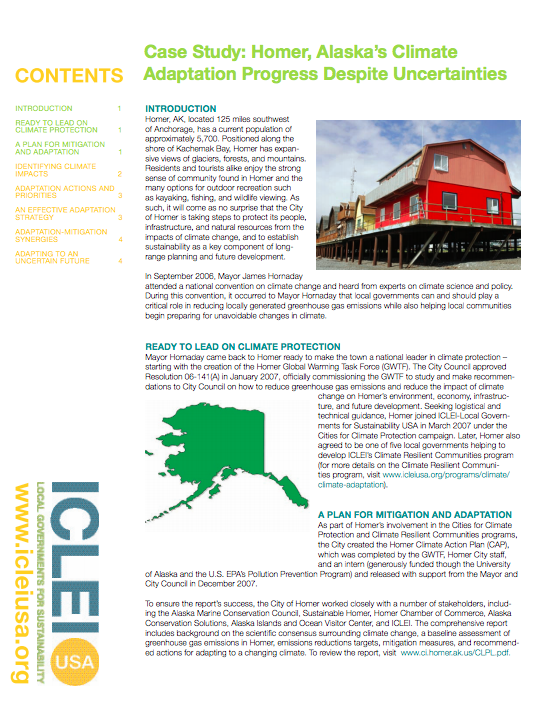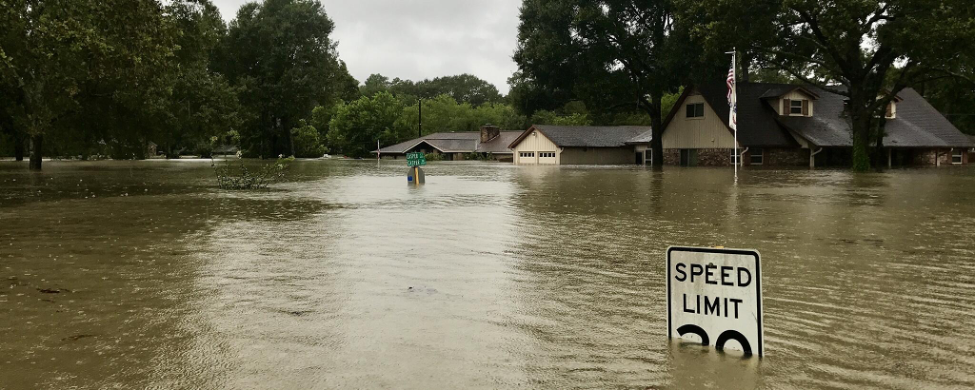Homer, Alaska Climate Action Plan
(c) 2005 Derek and Julie Ramsey (Ram-Man). Incorporated here under the Creative Commons Attribution-Share Alike 2.5 Generic license. No endorsement by licensor implied.
Posted by
Kirsten FeifelProject Summary
In 2007, Homer, Alaska was selected to pilot the ICLEI-Local Governments for Sustainability Climate Resilient Communities program. This program works with local governments to catalog greenhouse gas emissions and to develop mitigation and adaptation strategies. In December 2007, Homer released their Climate Action Plan. The plan identifies Homer’s vulnerabilities to climate change and suggests strategies to enhance its resilience such as encouraging local economic self-reliance, increasing firefighting capacity, and protecting and restoring wetlands. To fund these activities, Homer created a Sustainability Fund and a Revolving Energy Fund. The Homer City Council continues to prioritize work on the Climate Action Plan.
Background
In January 2007, Resolution 06-141(A) was passed by the City Council to establish a local Global Warming Task Force. In March 2007, Homer joined 700+ other cities as a signatory to the International Council for Local Environmental Initiatives’ (ICLEI) Cities for Climate Protection Campaign. Homer was selected by ICLEI to pilot its Climate Resilient Communities program, designed to help communities adapt to and prepare for climate change.
To identify key threats to Homer, climate model projections and scientific findings were extrapolated and applied at a local level. Key impacts of climate change to Homer may include rising sea levels, reduced health of fisheries resources, increased evaporation and transpiration of freshwater supplies, changes in storm frequency and intensity, and increased fires if the health of the surrounding forest is compromised by spruce bark beetle infestations. Homer’s local economy may also be impacted by changes in agriculture due to warming temperatures and shifting tourism patterns and population growth due to climate refugees.
Implementation
The Homer Climate Action Plan was developed in collaboration with the ICLEI Climate Resilient Communities program (now the Climate Adaptation & Preparedness Program). This program helps local governments design tools to assess vulnerabilities, prioritize actions, build resilience, and adapt to the impacts of climate change.
To initiate the Homer Climate Action Plan, greenhouse gas emissions were inventoried using the Clean Air and Climate Protection software. Future emissions targets were set to reduce Homer’s carbon footprint by 20 percent by 2020 as compared to 2000 levels. Mitigation measures to reduce greenhouse gas emissions were identified, ranging from increased dependence on renewable energy sources to altered human behaviors.
Developing adaptation measures is complementary to mitigation efforts. The City of Homer identified multiple actions to enhance the resilience of their community. Some of these include:
- Encourage local economic self-reliance, sustainable businesses, and climate awareness curriculum in local schools;
- Anticipate population growth and plan accordingly when making zoning and infrastructure decisions;
- Inventory the stormwater runoff system and identify areas vulnerable to sea level rise;
- Increase the community’s firefighting capacity;
- Protect and restore wetlands to increase water storage capacity;
- Restrict development along eroding shorelines; and
- Consider the effects of climate change in all long-term plans.
To implement the Climate Action Plan, Homer created a Sustainability Fund (Resolution 08-07(A)); sources of revenue for the fund included a private donation of more than $45,000. Other possible sources of revenue that were identified to support the implementation of the Climate Action Plan included grants, a Climate Action Tax (modeled after the Climate Action Plan in Boulder, Colorado), a fuel tax, parking fees, and other innovative sources.
Outcomes and Conclusions
Since the release of the Climate Action Plan in 2007, the city has put more emphasis on greenhouse gas mitigation and sustainable energy efforts than adaptation planning and implementation.
Resources:
City of Boulder, CO: The Future of Climate Action
STAPPA/ALAPCO's Clean Air and Climate Protection Software (CACPS)
Citation
Feifel, K. and Braddock, K.N. (2021). Homer, Alaska Climate Action Plan [Case study on a project of the City of Homer and ICLEI]. Version 2.0. Product of EcoAdapt's State of Adaptation Program. Retrieved from CAKE: https://www.cakex.org/case-studies/homer-alaska-climate-action-plan (Last updated August 2021)




